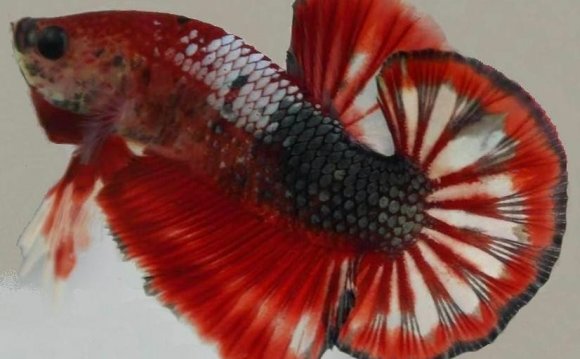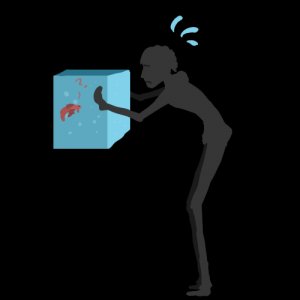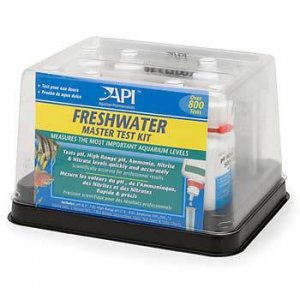
 Arrangements to make depend entirely on the fish tank set-up you have. If you haven’t yet, now might be the time to consider investing in a fully cycled aquarium. Vacationing—and everyday care—becomes significantly easier with a nitrogen cycle-balanced aquarium, especially if your tank uses live plants as or in supplement to your filtration! Options are severely limited if you have a small, uncycled, tank, so if you haven’t at least considered the option now is the time to read up on the benefits of a cycled aquarium.
Arrangements to make depend entirely on the fish tank set-up you have. If you haven’t yet, now might be the time to consider investing in a fully cycled aquarium. Vacationing—and everyday care—becomes significantly easier with a nitrogen cycle-balanced aquarium, especially if your tank uses live plants as or in supplement to your filtration! Options are severely limited if you have a small, uncycled, tank, so if you haven’t at least considered the option now is the time to read up on the benefits of a cycled aquarium.
When vacationing or leaving home temporarily while leaving behind a betta, only two of the animal’s most basic needs must be focused on: feeding and water quality. While you can get away with focusing on just these needs temporarily it is important to remember that healthy and well-cared for Betta fish need more than just food and clean water to thrive, so these methods of care should only be used for temporary situations.
Food
A common problem most Betta fish owners face is feeding their fish while away. People who are not familiar with fish tend to overfeed even if specific instructions are left behind as to how much food to feed, being unaware that that bettas have no ability to stop eating and can easily eat themselves to a painful death. And while there are automatic food dispensers and large food blocks meant to be left in tanks when owners are away, these options can be even more dangerous to your fish. Automatic feeders and food blocks provide more food than is healthy for a betta to eat and they dirty water quickly. Any time food is exposed to water ammonia, a naturally occurring chemical, is released into it. So not only will these choices potentially feed your fish to death, they also have high chances of poisoning and burning it with ammonia.
 Luckily, managing food for these fish is actually far simpler than any other concern when going away.
Luckily, managing food for these fish is actually far simpler than any other concern when going away.
A healthy betta needs to eat small portions of high-quality food everyday but a healthy betta also one useful evolutionary trick: it can survive for long periods of time without food and have few problems. Wild Betta fish evolved to survive in many harsh natural difficulties, such as drought or periods of starvation. As a result, bettas can easily go a week without food, provided that it has good nutrition on a regular basis to begin with. Right now the best Betta fish food is the betta pellet formula from New Life Spectrum because it is high in proteins from natural food sources and low on bloat-causing wheat and gluten fillers commonly found in high amounts in other brands. If on a nutritious diet of varied live and/or frozen foods in addition to high quality food pellets such as these, a betta can even go up to two weeks without eating—but this should only be done in emergency situations.
If you cannot find a reliable fish-sitter it is important to consider what your fish can and cannot healthily endure during your absence.
Water Quality
This is the tricky one. Depending on how large your tank is, whether it is cycled, how it is cycled, and whether or not you have a community tank, how long you can go without changing the water can differ. If you have an uncycled small tank, going away from more than a day or two is not recommended. The chemical spikes can easily hurt your fish and bring down its health. If you have a cycled tank that depends on a filter, holding no less than 5 gallons of water and containing no more than a single Betta fish, a week before a partial water change of 25% is generally safe. If you have plants and they are hardy plants that require little work to keep healthy, you may be able to go up to two weeks before a water change if you have a larger aquarium.
 To figure out what works best for you and your fish, take a look at the general outline at the bottom of this article for leaving fish at home alone.
To figure out what works best for you and your fish, take a look at the general outline at the bottom of this article for leaving fish at home alone.
Other Concerns
Some people worry about turning on their aquarium’s light while away. Betta fish have no need of artificial light, so unless you have live plants that require certain amounts of exposure do not worry about this. If you do have plants that have specific needs, consider purchasing an automatic light timer and testing it before you leave.
Another concern people have aside from food, water quality, and lighting, is temperature swings. Betta fish are tropical fish and require reliable heaters but summer weather, especially in a home that goes without air conditioning, can make you worry about keeping temperatures from spiking too high. Keeping blinds and curtains shut can help with room temperatures from rising to high. A fish tank kept away from natural lights and in the coolest part of the house will be a fish tank in the best situation.
Basically, you need to know your tank well. Every tank is unique and has different requirements for success. Betta fish are hardy and can survive in extreme conditions but it doesn’t mean they should. Consider instead, as a general rule, vacations that best suit the needs of you and your fish.
What to Consider for Your Fish
Two to Four Days: This is the best amount of time for those who have uncycled tanks. Not only will your fish run no risk of starvation but your water quality can be easily maintained with a water change before leave and immediately upon return. For a trip of this length of time, no feeding during your absence is needed.
Four to Seven Days: For tanks that hold at least 2.5 gallons of water and more, cycled or uncycled, this can be manageable. A water change and feeding before and after return will be a must. In this case, changing your fish’s water the day you leave and immediately on the day you return within the week is best. Doing so is especially important if your tank is uncycled and requires full water changes. A lack of food will help keep waste levels low so your water conditions should stay fine.
Seven or More Days: A vacation this long without help from someone is not recommended in most cases unless you have live plants. A week can be done and a tank can—in the case of emergency—go to even 10 days without a water change if cycled but anything longer than two weeks will require someone to change your water. Because this length of time will, without a question, require a large tank that is cycled and preferably well planted, a partial water change from a trusted someone is unavoidable. To make the best out of the situation, your helper should complete a partial water change as per your detailed instructions on the seventh or 10th day of your absence. This way your beloved pet can be fed and cleaned with time to spare while awaiting your arrival.









